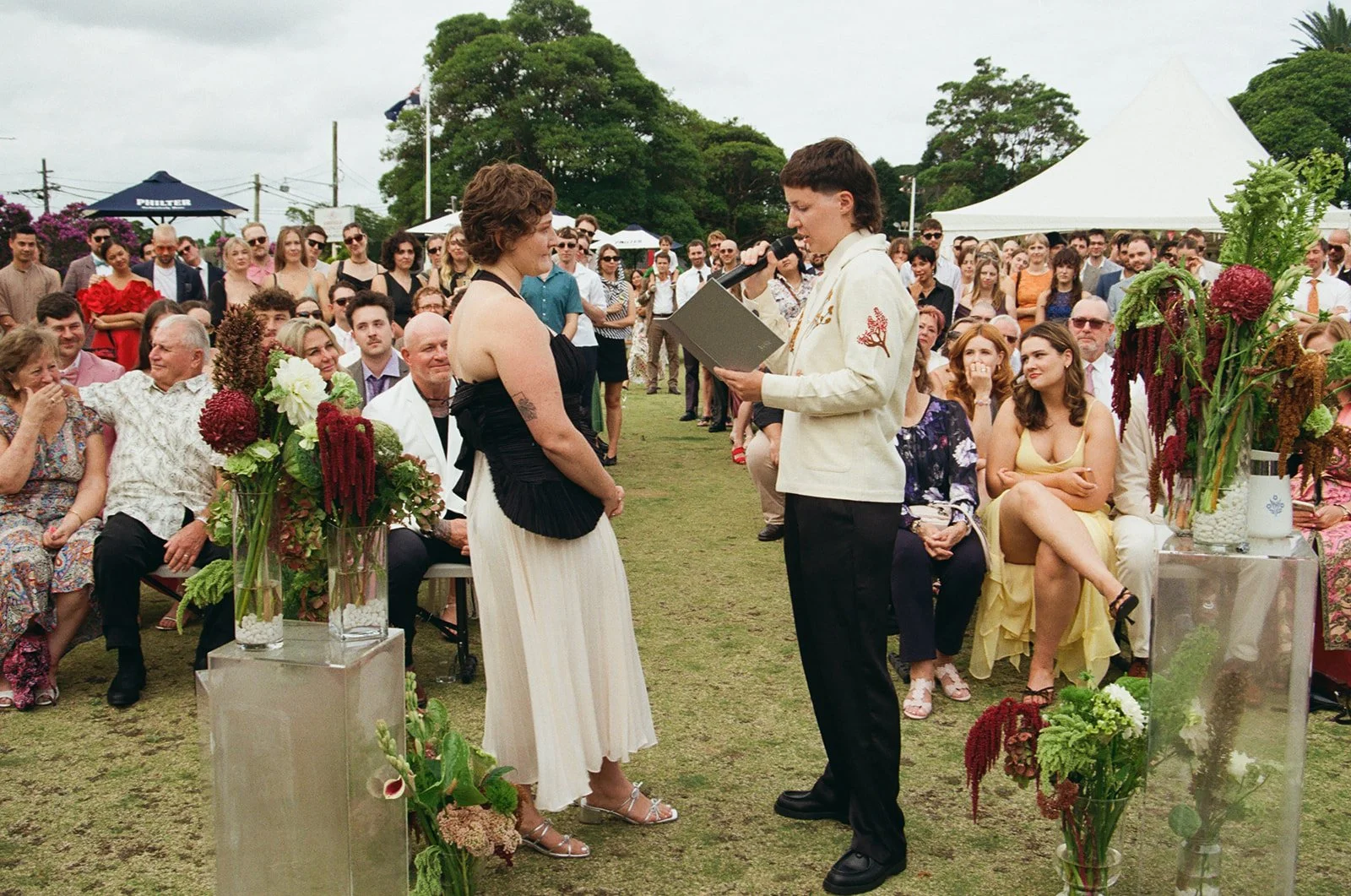Planning an Accessible Wedding as a Disabled Person (And Actually Enjoy It!)
Note: I use identify-first language in this blog post, but I fully respect that language is personal and I respect every way a person identifies.
Let’s be honest: wedding planning can feel like a full-time job. And if you’re a disabled person getting married you’re probably juggling joyful celebration and the usual barriers and BS that come with navigating inaccessible spaces and systems.
Here’s the good news: your wedding can be beautifully, unapologetically accessible.
Whether you’re rolling down the aisle, using mobility aids, navigating chronic illness, neurodivergence, sensory needs, or any combination of things - you deserve a celebration that works for you, not against you.
This guide is for you. It’s not about “accommodating” you like you’re a problem to solve. It’s about putting your needs and joy at the centre — where they belong.
Start with you
Not Just Your Guests
A lot of accessibility checklists focus on making the event more inclusive for guests — and yes, that’s important. But first and foremost: you are the heart of this wedding.
Ask yourself:
What helps me feel safe, present, and grounded in my body?
What tends to cause overwhelm, pain, or fatigue?
What would make this day feel accessible and celebratory, not just survivable?
Whether it’s building in breaks, shortening the ceremony, skipping traditions that don’t suit you, or having a comfy seat nearby during the whole thing — your needs are valid, and your day should reflect that.
Choose a venue that works for you
Many venues are… let’s say not great at access.
Cobblestones, stairs, inaccessible toilets, echoey halls, and tiny doorways are all too common. So start your venue search by prioritising spaces that meet your physical, sensory, and social access needs.
Things to look for:
Step-free access (into and throughout the venue)
Accessible toilets
Wide doorways and paths
Quiet spaces for rest or sensory regulation
Good lighting and sound quality
Staff who understand access & respect your autonomy
Hot tip: If a venue says “we’re accessible,” ask for specifics. Accessibility isn’t just a buzzword. It’s about functionality, dignity, and autonomy. You get to decide what works for your body and brain - not the venue manager.
Build a timeline that respects your energy
You don’t need to cram your wedding into an exhausting 12-hour marathon.
In fact, a shorter or staggered event might feel better for you — and your guests will follow your lead.
Ideas to consider:
A later start so you can rest in the morning
Built-in rest breaks between ceremony and reception
Soft seating throughout the space — not just at reception tables
A second outfit if formalwear becomes uncomfortable
Low-stimulation options like quiet zones, dimmed lighting, or chill-out corners
You don’t need to explain or justify these choices. This is your day. It should work for you.
Reimagine “Tradition”
in a way that affirms you
Some traditions just don’t serve disabled people. And that’s okay.
Don’t feel pressured to:
Walk down the aisle if that doesn’t suit your mobility
Wear something that causes discomfort or dysphoria
Stand for long periods during the ceremony
Exchange rings if your hands don’t do rings (tattoos, necklace charms, and spoken vows are just as meaningful)
Your wedding doesn’t need to look like the movies. It needs to look like you.
Communicate Access with Clarity (and love)
If you’re inviting other disabled people to your wedding (yay, community!), communicate openly about what access will be available.
That might look like:
An access guide on your wedding website
Inviting access requests on the RSVP form
Listing things like accessible parking, step-free paths, Auslan interpreters, dietary info, etc.
Example RSVP wording:
We want everyone to feel safe, comfortable, and celebrated at our wedding. If there’s anything we can do to support your access on the day, please let us know when you RSVP.
Work With Vendors Who Respect Disabled Clients
From your celebrant to your photographer, your team should respect you — not “accommodate” you as an afterthought. You deserve vendors who:
Use inclusive language
Ask about your access needs without making assumptions
Know how to communicate clearly and adapt on the fly
Are genuinely excited to celebrate you as a disabled person
You are not “difficult.” You are not “too much.” You’re setting the standard for what an affirming, inclusive wedding can look like.
(And if you’re working with me, I’ll be your loudest cheerleader every step of the way.)
Disabled Love is Powerful. Celebrate it Fully.
Being a disabled person getting married is a radical act of joy. You are claiming space in a world that too often tries to limit or ignore us — and saying, “This is love. This is worthy. This is mine.”
You don’t have to shrink yourself. You don’t have to fake being “less disabled” for anyone’s comfort.
Your love deserves a ceremony that sees you, celebrates you, and includes you.
Ready to Plan an Accessible, Joy-Filled Wedding?
If you want help creating an accessible ceremony that’s deeply personal and affirming, I’d be honoured to be part of your journey. Let’s make this celebration everything your beautiful disabled self deserves.








So whether you're planning a romantic escape, a low-key legal ceremony, or a full destination wedding celebration, this guide will walk you through how LGBTQIA+ or Queer couples from overseas can get married in Australia—legally, simply, and joyfully.